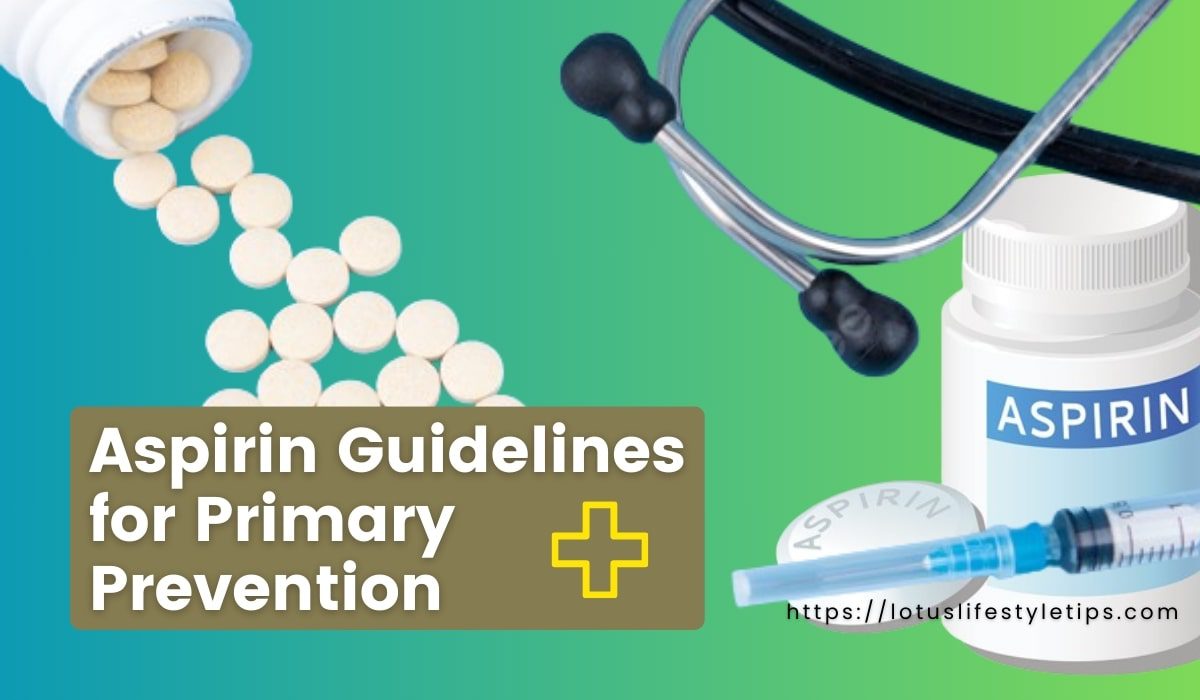Aspirin for Primary Prevention: Aspirin has long been a staple in the prevention of cardiovascular diseases (CVD). For years, medical professionals have recommended low-dose aspirin to help prevent heart attacks and strokes, particularly for those at high risk. However, recent updates to the guidelines have caused a significant shift in how aspirin is viewed for primary prevention. In this post, we will delve into the new guidelines, their implications, and what you need to know to stay informed and healthy.
Understanding Primary Prevention
Primary prevention refers to measures taken to prevent the onset of a disease before it occurs. In the context of cardiovascular disease, primary prevention strategies include lifestyle modifications such as diet and exercise, as well as pharmacological interventions like the use of aspirin.
The Role of Aspirin in Primary Prevention
Aspirin works by inhibiting platelets in the blood, preventing them from clumping together to form clots. This anti-clotting property has made it a valuable tool in preventing heart attacks and strokes. For many years, low-dose aspirin has been recommended for individuals who have not yet had a cardiovascular event but are considered at high risk.
The New Guidelines
Recent studies have prompted a reevaluation of aspirin’s role in primary prevention. The American College of Cardiology (ACC) and the American Heart Association (AHA) have updated their guidelines based on the latest evidence.
- Low-Risk Individuals: For adults over 70 or those at increased risk of bleeding, the use of low-dose aspirin for primary prevention is generally not recommended due to the potential risks outweighing the benefits.
- High-Risk Individuals: For certain high-risk adults aged 40-70 who are not at increased risk for bleeding, low-dose aspirin may still be considered for primary prevention. The decision should be made on an individual basis, taking into account the patient’s specific risk factors and health history.
Why the Change?
The updated guidelines reflect a growing body of evidence suggesting that the risks associated with aspirin, such as gastrointestinal bleeding and hemorrhagic stroke, may outweigh the benefits for many individuals. Previous recommendations were based on older studies that did not fully account for these risks.
Implications for Patients
Patients who have been taking aspirin for primary prevention should not stop without consulting their healthcare provider. The new guidelines emphasize personalized care, meaning that decisions should be based on individual risk factors and patient preferences.
Steps to Take
- Consult Your Doctor: If you are currently taking aspirin for primary prevention, schedule a discussion with your healthcare provider to evaluate your risk factors and determine if continuing is appropriate for you.
- Assess Your Risk: Understand your personal risk factors for cardiovascular disease, including age, family history, blood pressure, cholesterol levels, and lifestyle choices.
- Adopt a Heart-Healthy Lifestyle: Focus on non-pharmacological approaches to reduce your risk, such as a balanced diet, regular exercise, smoking cessation, and maintaining a healthy weight.
FAQs
Q: Who should not take aspirin for primary prevention?
A: Adults over 70 or those with an increased risk of bleeding should generally avoid low-dose aspirin for primary prevention.
Q: Can younger adults take aspirin for primary prevention?
A: Certain high-risk adults aged 40-70 who are not at increased risk of bleeding may still consider low-dose aspirin, but this should be discussed with a healthcare provider.
Q: What are the risks of taking aspirin?
A: Risks include gastrointestinal bleeding, hemorrhagic stroke, and other bleeding complications.
Q: How do I know if I’m at high risk for cardiovascular disease?
A: High risk is determined by factors such as age, family history, high blood pressure, high cholesterol, diabetes, smoking, and lifestyle factors.
Q: Should I stop taking aspirin if I’m currently on it for primary prevention?
A: Do not stop taking aspirin without consulting your healthcare provider, as this decision should be based on a personalized risk assessment.
Conclusion
The new guidelines for aspirin use in primary prevention highlight the importance of individualized care. While aspirin has been a cornerstone in preventing cardiovascular events, its use must be carefully weighed against potential risks. By staying informed and working closely with healthcare providers, patients can make the best decisions for their health. Always consult your doctor before making any changes to your medication regimen.
Also. Read: Green Tea Vs Black Tea: Surprising Health Benefits|Which Is A Better Choice
Visit: https://travelinsightful.com Travel Insightful – Behold The Power of Travel
Discover more from Lotus LifestyleTips
Subscribe to get the latest posts sent to your email.


Thankyou for this useful information